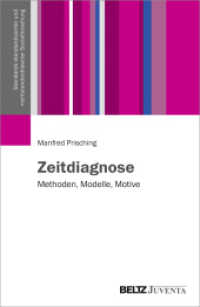- ホーム
- > 洋書
- > ドイツ書
- > Humanities, Arts & Music
- > Linguistics
Full Description
This book provides a summary of Radical Minimalism, putting forth a neurocognitively implementable theory of grammar as I-language. Radical Minimalism tries to give a 'fully explicit' description of syntactic structures mapped into cognitive frames of thought. It focuses on the division of labor between Narrow Syntax and Meaningful Units of the sentence and also on the role of Mental Lexicon (understood as a selection of Roots and Labels), the Labeling Mechanism, and the participation of the Senso-Motoric and Conceptual-Intentional Interfaces within a Crash-proof Grammar of Human Language. The data are taken from the languages of different genetic origins and types. The book is based on the idea that language and thought are closely connected and must be studied within the physical laws of the Anti-Entropy and Dynamical Frustration theory.
Peter Kosta's new book touches on an exceptional range of subjects in theoretical syntax and the philosophy of grammar, bearing ample proof of his lifelong engagement with these vital disciplines within the humanities of the 20th/21st centuries. His acute awareness of important insights and discussions in current day minimalism is evident from every page, informing his treatment of a wide diversity of problems in the morphosyntax of Slavic languages and beyond.
(Jan-Wouter Zwart, University of Groningen)
This book provides a breath of fresh air in linguistic theorising by combining empirically based syntactic innovations with original discussions of long-standing semantic puzzles and a revised architecture of the Faculty of Language. Foundational notions in generative theory are thoroughly revised in the light of detailed comparative analyses. This remarkable work represents the culmination of years of research on what meaning is, how it is structured, and to what extent syntax encodes meaning.
(Diego Gabriel Krivochen, University of Verona)
Contents
Contents - Introduction - Third Factor "Relevance" between Semantics, Pragmatics, and Syntax - The Language of Thought Hypothesis, Classes, and Relations - Gender and Animacy between Displacement and Agreement - Adjectival and Argumental Small Clauses vs. Free Adverbial Adjuncts - A Phase-Based Approach within the Radical Minimalism with Special Criticism of the Agree, Case and Valuation Notions - Case and Agree in Slavic Numerals - Valuation of Features at the Interfaces within a Phase-Based Model - On Phases, Escaping Islands, and Theory of Movement (Displacement) - On the Causative/anti-Causative Alternation as Principle of Affix Ordering in the Light of the Mirror Principle, the Lexical Integrity Principle and the Distributed Morphology - Radical Minimalist Hypothesis and Early Grammars - Bibliography - Index






